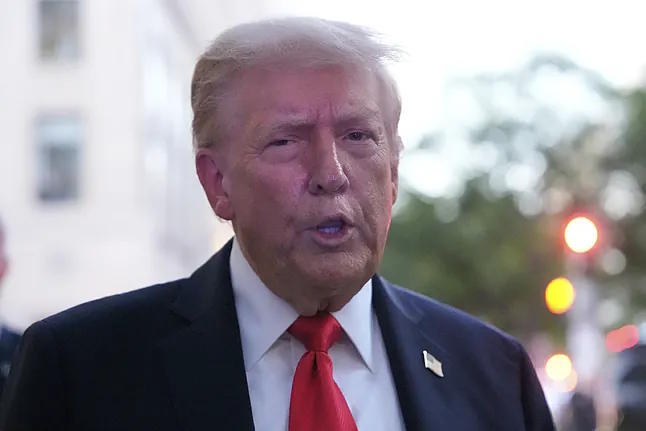The President of the United States, Donald Trump, was aware of the penetration of nearly two dozen Russian drones into Polish airspace almost from the beginning. On Tuesday night (early Wednesday in Europe), the president went out to dinner with his team at a restaurant very close to the White House, amidst his efforts to convince millions of Americans that the city streets are now safe. Upon leaving the restaurant, where he was booed by some customers, journalists specifically asked him about what was happening near the border between Poland and Ukraine, but Trump did not comment.
Secretary of State, Marco Rubio, simply stated that he had been informed about the issue, either by intelligence services or military commanders, but did not comment further. In other words, while initial reports on armed drones arrived after two days of brutal bombings in Ukraine, flying over the territory of a NATO ally without clarity on what was happening, the president, his Foreign Minister, and Defense Minister, Pete Hegseth, continued their dinner as usual.
It is this complacency, passivity, and lack of interest in international security and the Russian threat that concerns Europe. 24 hours after the incident, the most serious in a long time, the White House remained publicly silent. The Polish president, who visited Washington last week, reported having spoken on the phone with Trump, but there was no reaction from his administration. "I just spoke on the phone with the President of the United States, Donald Trump, about the multiple violations of Polish airspace by Russian drones that occurred tonight. The conversation is part of a series of consultations I am conducting with our allies. Today's conversations confirmed the unity of the Alliance," the Polish president stated.
In the U.S., in the specialized community and in Congress, controlled by the Republican Party in both chambers, there is nervousness. For months, an ambitious package of sanctions has been prepared, waiting for Trump to decide to tighten the screws, instead of repeatedly giving "two weeks" to Vladimir Putin to accept a peace agreement. Republican leaders believe that this incursion into Polish airspace, and Warsaw's mention of Article 4 of NATO, could finally be the trigger for a change in tone and attitude.
However, the first and only reaction from the White House on Wednesday was strange, very cryptic. In a social media post at 11:00 a.m., Trump wrote: "Why is Russia violating Poland's airspace with drones? Here we go!". Nothing more and in a very open, informal language. Everyone expected a deeper explanation that never came. In the afternoon, the death of Charlie Kirk, a young conservative leader, affected the president, who canceled the rest of his schedule.
Nevertheless, like Republican Senator Lindsey Graham, a veteran of the upper chamber and foreign policy, historically a hawk but at the same time close to Trump and serving as a bridge when not a spokesperson for his most controversial and ambiguous decisions, especially regarding Russia and Ukraine, decided to seize the moment and confusion to push the White House for tougher measures against Moscow. "Mr. President, Congress is with you. We are ready to pass legislation authorizing new devastating sanctions and tariffs that can be applied at your discretion. Our goal is to empower you as you face this growing threat (...) To Europe: I hope you understand that Republicans and Democrats in Congress are working with President Trump on new ideas - like tariffs - to end this war. I hope you are also paying attention," he wrote in his lobbying message.
"Last night, Russia clearly and deliberately attacked Poland and, in turn, NATO. What would be the logic behind this? I believe their purpose was to test our determination and response capability. Putin has calculated that there will only be a consultation under Article 4 (discussions among NATO members) and that he can use the same card if NATO threatens a response: flaunt his nuclear weapons and claim that he would consider any response to his attack as an act of war. The United States and our allies should not fall into the trap," stated Republican Congressman Brian Mast, Chairman of the House Foreign Affairs Committee.
